
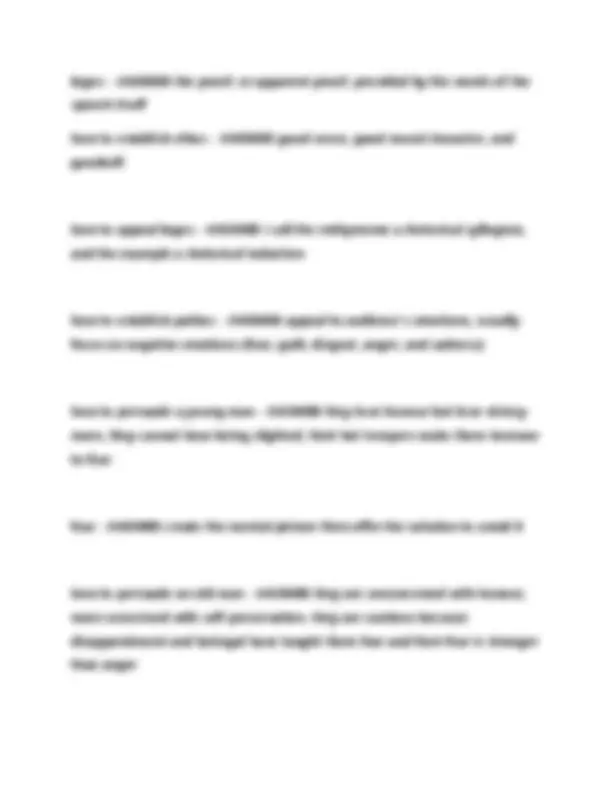
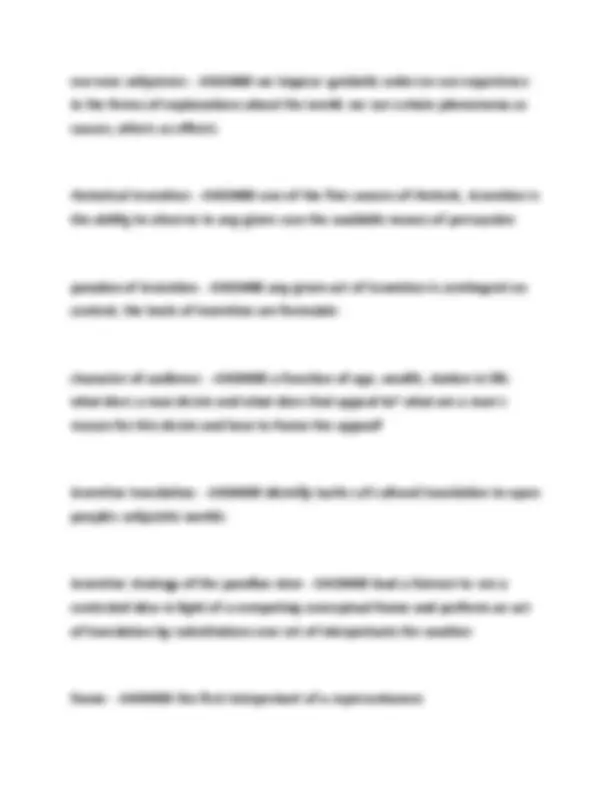
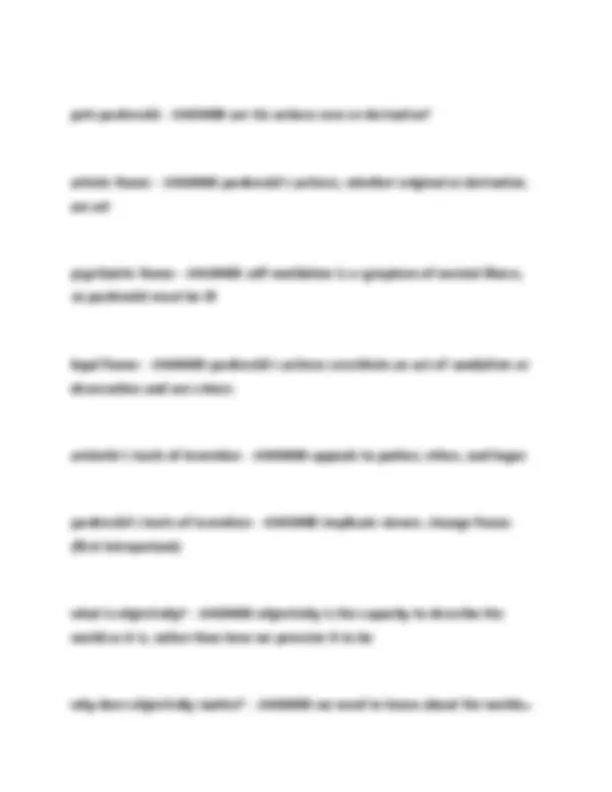
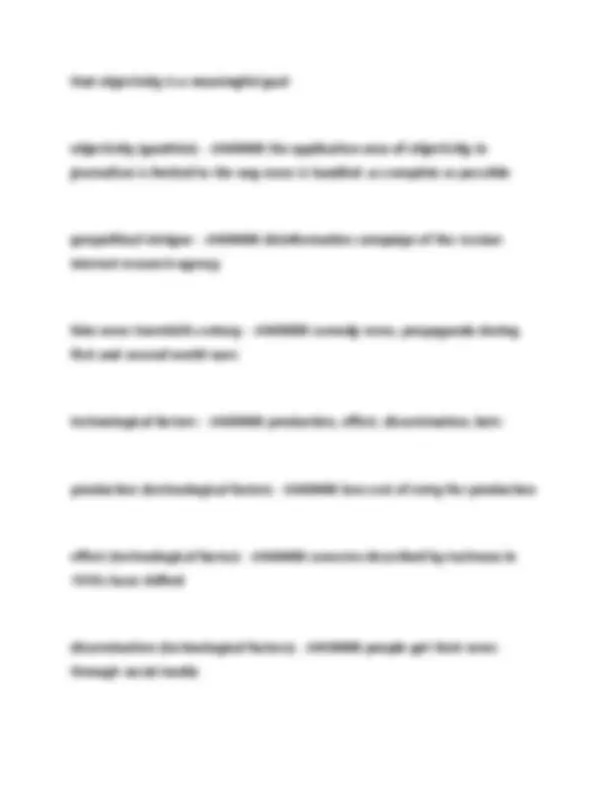
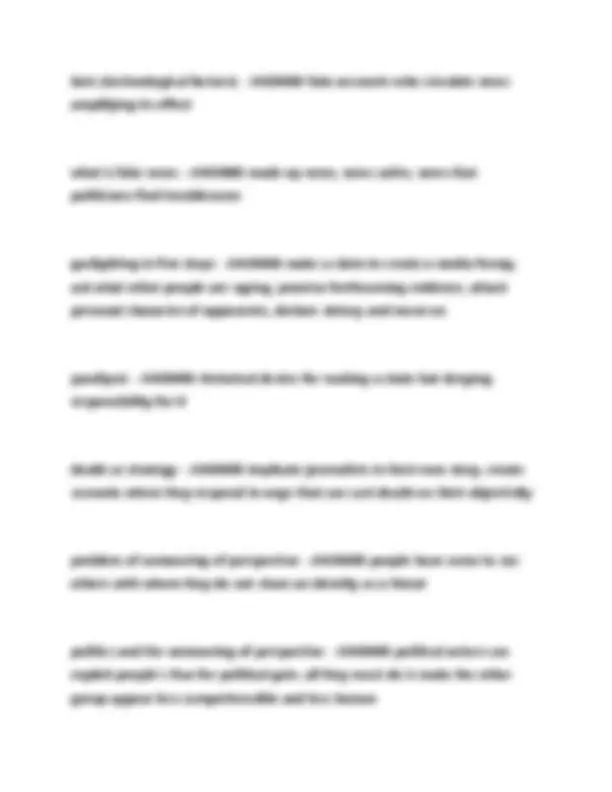
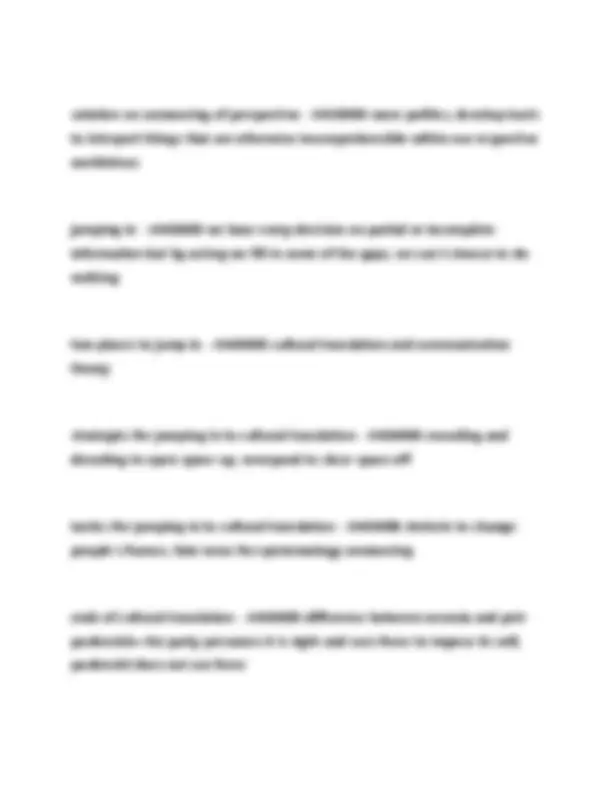


Study with the several resources on Docsity

Earn points by helping other students or get them with a premium plan


Prepare for your exams
Study with the several resources on Docsity

Earn points to download
Earn points by helping other students or get them with a premium plan
Community
Ask the community for help and clear up your study doubts
Discover the best universities in your country according to Docsity users
Free resources
Download our free guides on studying techniques, anxiety management strategies, and thesis advice from Docsity tutors
A comprehensive final exam covering key concepts in communication studies, including epistemology, rhetoric, and objectivity. it explores different approaches to knowledge, persuasive techniques, and the challenges of achieving objectivity in journalism and communication. The exam includes questions and answers that delve into the complexities of these topics, making it a valuable resource for students studying communication.
Typology: Exams
1 / 11

This page cannot be seen from the preview
Don't miss anything!







Epistemology - ANSWER how do we know what we know? what is it that we know? are our senses trustworthy?
puzzle-solving (science) description - ANSWER the world exists independently of our knowledge of it, and we can know it exhaustively. we should describe the world in order to make predictions about it
puzzle solving (science) critiques from interpretive scholars - ANSWER this approach gives the scientific community undue authority to decide which problems are worthy of attention. it excludes other ways of knowing the world and it essentializes its objects of study
puzzle solving (investigation) description - ANSWER the world exists independently of our knowledge of it but we cannot know it exhaustively. we must refine our explanations in order to make predictions
puzzle solving (investigation) critiques from interpretive scholars - ANSWER this approach describes surface phenomena but not the forces that underlie them. it also privileges certain ways of knowing at the expense of others
puzzle making (interpretation) description - ANSWER we do not all experience the world in the same way. we create it symbolically and we study it. we should explain the world, not predict it
puzzle making (interpretation) critiques from scientific scholars - ANSWER this approach is relativistic and not objective. it relies on unverifiable internal
experiences
puzzle making (inquiry) description - ANSWER we actively know the world in different ways, which are inextricably linked to relations of power. we must pose questions that allow us to uncover the underlying forces that shape our view of the world
puzzle making (inquiry) critiques from scientific scholars - ANSWER this approach is too political and too personal. it provides unstable ground in which to build anything
principles of newspeak - ANSWER describes a system for substituting one word for another. it puts forth a philosophy of translation
goals of newspeak - ANSWER to restrict thought
effects of newspeak - ANSWER cut people off from old ways of speaking
goal/effect of newspeak - ANSWER create conditions of collective solipsism
solipsism - ANSWER the theory that the self is the only reality
solipsism strategy - ANSWER gaslighting. make people trust what you tell them about the past, not their own memory
rhetoric - ANSWER the faculty of observing in any given case the available means of persuasion
types of persuasion - ANSWER political, forensic, ceremonial
ethos - ANSWER the personal character of the speaker when the speech is so spoken as to make us think him credible
pathos - ANSWER putting the audience into a certain frame of mind
our own solipsisms - ANSWER we impose symbolic order on our experience in the forms of explanations about the world. we see certain phenomena as causes, others as effects
rhetorical invention - ANSWER one of the five canons of rhetoric, invention is the ability to observe in any given case the available means of persuasion
paradox of invention - ANSWER any given act of invention is contingent on context, the tools of invention are formulaic
character of audience - ANSWER a function of age, wealth, station in life. what does a man desire and what does that appeal to? what are a man's reason for this desire and how to frame the appeal?
inventive translation - ANSWER identify tactics of cultural translation to open peoples solipsistic worlds
inventive strategy of the parallax view - ANSWER lead a listener to see a contested idea in light of a competing conceptual frame and perform an act of translation by substitutions one set of interpretants for another
frame - ANSWER the first interpretant of a representamen
petr pavlenskii - ANSWER are his actions new or derivative?
artistic frame - ANSWER pavlenskii's actions, whether original or derivative, are art
psychiatric frame - ANSWER self mutilation is a symptom of mental illness, so pavlenskii must be ill
legal frame - ANSWER pavlenskii's actions constitute an act of vandalism or desecration and are crimes
aristotle's tools of invention - ANSWER appeals to pathos, ethos, and logos
pavlenskii's tools of invention - ANSWER implicate viewer, change frame (first interpretant)
what is objectivity? - ANSWER objectivity is the capacity to describe the world as it is, rather than how we perceive it to be
why does objectivity matter? - ANSWER we need to know about the world—
gilles gauthier - ANSWER despite attacks on objectivity, it is a value worth defending
what objectivity isn't and what it is - ANSWER gauthier critiques tuchman for examining the use reporters make of objectivity as an idea but not what objectivity is. gauthier proceeds by describing what objectivity isn't in order to conclude by saying what it is
reporting vs analysis - ANSWER objectivity can only be applied to straight news reporting, analysis is a valid journalistic approach but by definition it is not objective
genre - ANSWER objectivity can only be applied to that genre of news reporting known as the news story, thus it is not applicable to what he identifies as the two other genres of news: news analysis and commentary
news gathering vs news reporting - ANSWER objectivity does not apply to news gathering, journalists must make a selection: they can't describe everything exhaustively. there is no whole truth to be told
formal and material constraints - ANSWER objectivity does not apply to the formal external conditions of news reporting. external conditions influence reporting but they are merely a challenge to be overcome. it is in production
that objectivity is a meaningful goal
objectivity (gauthier) - ANSWER the application area of objectivity in journalism is limited to the way news is handled. as complete as possible
geopolitical intrigue - ANSWER disinformation campaign of the russian internet research agency
fake news twentieth century - ANSWER comedy news, propaganda during first and second world wars
technological factors - ANSWER production, effect, dissemination, bots
production (technological factor) - ANSWER low cost of entry for production
effect (technological factor) - ANSWER concerns described by tuchman in 1970s have shifted
dissemination (technological factors) - ANSWER people get their news through social media
solution on unmooring of perspective - ANSWER more politics, develop tools to interpret things that are otherwise incomprehensible within our respective worldviews
jumping in - ANSWER we base every decision on partial or incomplete information but by acting we fill in some of the gaps, we can't choose to do nothing
two places to jump in - ANSWER cultural translation and communication theory
strategies for jumping in to cultural translation - ANSWER encoding and decoding to open space up, newspeak to close space off
tactics for jumping in to cultural translation - ANSWER rhetoric to change people's frames, fake news for epistemology unmooring
ends of cultural translation - ANSWER difference between oceania and petr pavlenskii— the party presumes it is right and uses force to impose its will, pavlenskii does not use force
openness to others - ANSWER our engagement in cultural translation implies an openness to others. if we weren't open we wouldn't engage